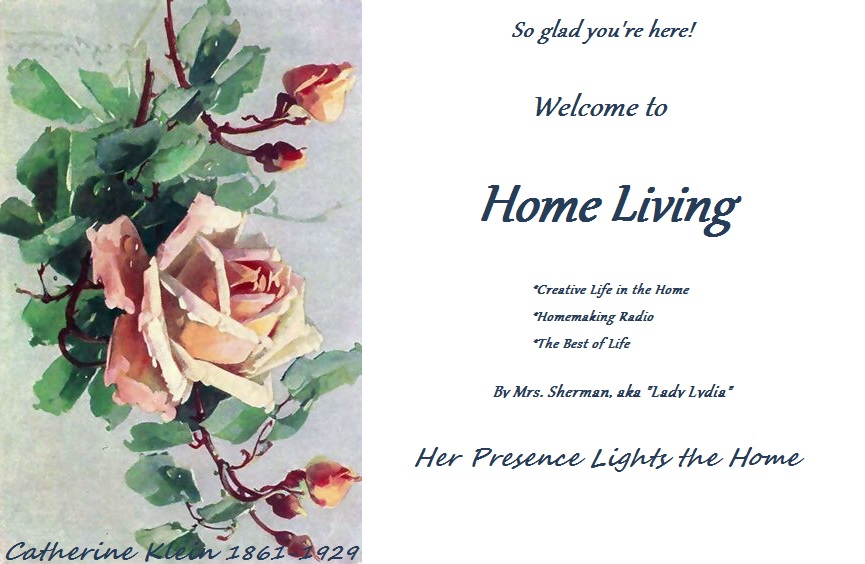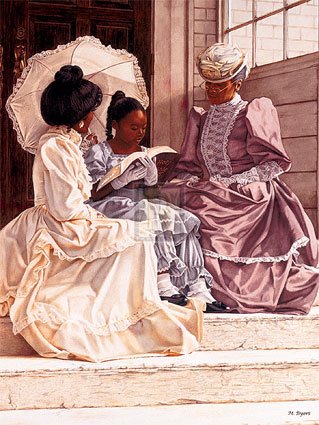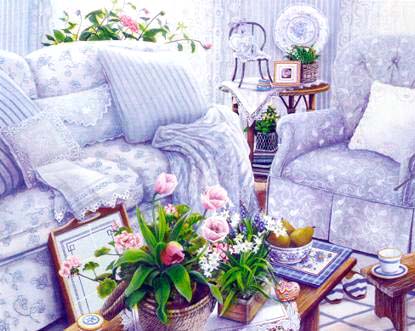Wednesday, April 30, 2008
Ideal Toy Chest
Tuesday, April 29, 2008
Be Renewed
 White Trellis With Roses
White Trellis With RosesRomans 12:2 And be not conformed to this world: but be ye transformed by the renewing of your mind, that ye may prove what is that good, and acceptable, and perfect, will of God.
I hope this will, maybe in part, answer the question about how to "school" our feelings, which, in my opinion, is just channelling thoughts and feelings into a profitable direction. It means to be calmly assured, rather than restless, discontent, upset. It does not come naturally to everyone. A lot of people are very susceptible to suggestion, and their emotions are tuned into just about everything that happens or might happen. Feelings have to be guarded and trained. For example, there are some times you might not feel like making lunch, but you have others to think about and they depend on you to make lunch, so you overcome your feelings and do what is best for them.
Renewing the mind can do many things: it can make the cloudy, dark weather seem inconsequential, as we busy ourselves doing what needs to be done. Renewing the mind can make life richer, just by focusing on what is good. Now and then, someone is going to make a rude remark that will make you feel worthless, but you can endure it by substituting worthwhile activity. Clean a drawer, catch up on correspondence, do some hand work, and foremost of all, fix yourself up as though you are on top of the world.
Conforming to the world also means that we feel controlled by today's fashions,news,music, education, and even by the current personal relationship trends. It is a never-ending cycle of keeping up with everything. The solution is to stick with something you love, whether it be a style of decorating, the reading you like, clothing, cooking, or the type of outings you enjoy, and let the world and its trends pass on by. You won't miss the stress of constant change.
The Bible says that we aren't to be conformed by all that the world is beckonning us to , but to prove what is the good and acceptable will of God. You aren't going to prove the beautiful , God-given role of women in the home if you spend the day upset and worrying. You will prove it if you do not waste time trying to conform to the world's dictates, while giving your home your very best.
I've always believed in substituing a "yes" for a "no." When my mind wants to dwell on bad news, I substitute a favorite hymn or scripture. Each time a plaguing thought comes to your head, sing that song or quote that scripture, even if it happens all day long. It will school the mind and bring something productive and positive into your life.
Here is a verse I like :
Isaiah 26:3 "Thou wilt keep him in perfect peace, whose mind is stayed on thee: because he trusteth in thee. "
Here is a
Sunday, April 27, 2008
I Will Walk Within My House
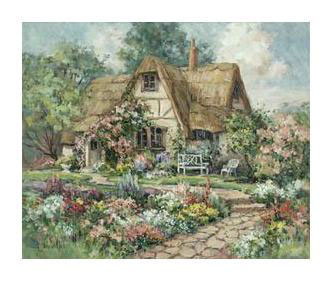 Spenny Moor Mansion by Barbara Mock
Spenny Moor Mansion by Barbara MockPsalm 101:2 I will behave myself wisely in a perfect way. O when wilt thou come unto me? I will walk within my house with a perfect heart.
 Secluded Garden by Barbara Mock
Secluded Garden by Barbara MockThe verse above reminds me of something I have always wanted for myself and others within my home. If that is the thought that is uppermost, then even when there is trouble, we will always be trying to get close to that standard. People are always wondering what to do if they have "blown it" or gone down a wrong path, messing up their lives and their homes. No one is perfect, but we can get as close to the model as possible. At least, we have a model in the scriptures, of the home as it should be. That in itself is good to look to, even when we haven't lived up to it. It will help us look up instead of back.
Friday, April 25, 2008
The Plain House - The Entrance
Wednesday, April 23, 2008
The Plain House - Outside Touches
 Southern Shadows 2 by Kimberly Hudson from Lovely Whatevers
Southern Shadows 2 by Kimberly Hudson from Lovely Whatevers Coquina Coast 2 by Kimberly Hudson, from Lovely Whatevers
Coquina Coast 2 by Kimberly Hudson, from Lovely Whatevers Southern Shadows 1 by Kimberly Hudson from Lovely Whatevers
Southern Shadows 1 by Kimberly Hudson from Lovely Whatevers Coquina House 1 by Kimberly Hudson from Lovely Whatevers
Coquina House 1 by Kimberly Hudson from Lovely WhateversTuesday, April 22, 2008
A Plain House - Inside Windows
 Painting by Robin Anderson from Lovely Whatevers
Painting by Robin Anderson from Lovely WhateversI read in an old homemaking book that curtains with a rod pocket put on a simple rod were a much better idea. It is easier on the homemaker to wash them. Mine were made of 109 inch white muslin, and trimmed with ball-fringe. I've always liked the way that looks in a window from the outside. All I had to do was iron over a portion of the top for the rod to be inserted, and make a hem at the other end. The sides were the selvage.
 Painting by Robin Anderson from Lovely Whatevers
Painting by Robin Anderson from Lovely Whatevers
Spring Window by Consuelo Gamboa.

French Windows and Curtains by Francois Chopin
 painting by Robin Anderson, from Lovely Whatevers
painting by Robin Anderson, from Lovely Whatevers
Sunday, April 20, 2008
A Plain House - The Front Door
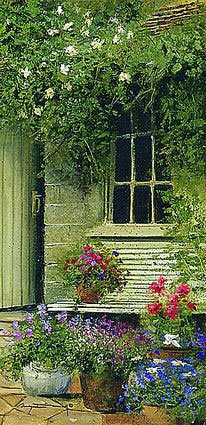 Here, plants in pots make quite an artistic scene, especially when one is on a seat. The pots are as important as the plants, though. I prefer the containers to be as ornate as possible, painted, perhaps, in a favorite color, and on a pedestal of some kind, so that looks like a huge, fancy outdoor vase. Do you recall paintings of Victorian homes where huge vases that looked like cups, with handles on both sides, were filled with flowering plants, decked on both sides of the stoop? I quite like the flower pots that look like giant baskets, also. Each homemaker has to determine what she likes and what makes her smile and feel enthusiastic about her house.
Here, plants in pots make quite an artistic scene, especially when one is on a seat. The pots are as important as the plants, though. I prefer the containers to be as ornate as possible, painted, perhaps, in a favorite color, and on a pedestal of some kind, so that looks like a huge, fancy outdoor vase. Do you recall paintings of Victorian homes where huge vases that looked like cups, with handles on both sides, were filled with flowering plants, decked on both sides of the stoop? I quite like the flower pots that look like giant baskets, also. Each homemaker has to determine what she likes and what makes her smile and feel enthusiastic about her house. Windowboxes also add depth and shape to an otherwise plain house. There are now some very simple type you can get at Dollar Tree and other discount stores. They are made of wrought iron and lined with a peat pad. You just add your favorite bedding plants. This entire thing hooks over the window sill.
Windowboxes also add depth and shape to an otherwise plain house. There are now some very simple type you can get at Dollar Tree and other discount stores. They are made of wrought iron and lined with a peat pad. You just add your favorite bedding plants. This entire thing hooks over the window sill.Saturday, April 19, 2008
A Plain House (1)

The plainest home of the 19th century seemed to have an allure even without embellishment. The architecture was so much more interesting, that it did not take much to make the house interesting: a few plants,and lace curtains in the windows. Inside, the little nooks and crannies had so many built-in features--shelves and ledges, etc. that even the plainest furniture did not detract from it.
Today there are special problems with plain houses. Often they are little more than boxes with windows. I often wondered what the secret was to getting those plain homes to shine out a feeling of love.
I have lived in many of these kinds of houses and after puzzling over them and finding that even the decorating schemes of the times were too expensive and did not really help, have come up with just a few, inexpensive things that might help make a plain house look more like a home.
Today I'm just going to deal with one feature: the outside front entrance.
I noticed on this porch there is a little rug. That also, adds a lot, but so many of the outdoor mats curl up and cause more trouble than they are worth, so they have to be chosen with care. It has to have meaning to you beyond just being a mat to wipe the feet. Considering the color and design will have an impact on making that plain house more interesting on the outside
Friday, April 18, 2008
When Are You Going to Get a Job?
 Victorian Spring by Susan McClure
Victorian Spring by Susan McClureThe Answer of a Man

In keeping with short posts, I'd like to provide one answer to those who make rude remarks about the role of the full time homemaker. Hopefully I will have time for more posts on this subject. There is a variety of answers that can be offered.
Pro 15:23 A man hath joy by the answer of his mouth: and a word spoken in due season, how good is it!
Wednesday, April 16, 2008
Beautiful Hands

 This scenic window is so nostalgic of childhood scenes when homes often had places to look out at, or walks afforded good scenery, even if it was a little slope here or a meadow there and a little creek. It is copyright free from Dover Clip-Art so you can use it on your blogs if you like.
This scenic window is so nostalgic of childhood scenes when homes often had places to look out at, or walks afforded good scenery, even if it was a little slope here or a meadow there and a little creek. It is copyright free from Dover Clip-Art so you can use it on your blogs if you like.Tuesday, April 15, 2008
The Value of Real Work
 Her Office from http://www.allposters.com/
Her Office from http://www.allposters.com/Homemaking is a multi-faceted job, much more so than any other job a woman could have. If you work in an office, you will probably not be required to clean the floor or the windows. Another crew, from another company, will be hired to do that. You will probably not go to the cafeteria or restaurant and cook your own food. You will not be required to sweep the walkway to the place of work. You won't be mowing the lawn. You will not be repairing anything inside the office or on the outside of the structure where you work. You won't be greeting everyone or doing all the correspondence if you are in a firm where the work is specifically assigned amongst other employees.
If anyone thinks that being home full time is taking the easy way out of trying to have a soft life, just invite the over and let them help you with your day, which will not end at 5 pm with other institutions.
The so-called "work ethic" existed long before it was labelled "the work ethic." From the beginning of time, work existed. God invented it, for he worked when he created the world and mankind. Man himself was created to work. Adam was given the first job in the Garden of Eden, to dress it and care for it. Eve was given the job of being a helper fit for him. Later, Adam was told to work "by the sweat of his brow," in order provide for his family. Obviously, work requires some exertion. No religious group invented the "work ethic, for it was taught in the New Testament in instructions to members of Christ's body, the church. Church members were warned particularly to be busy, to provide for their families, and not to "pilfer, purloinThe words about working with your hands and not being a burden on others were written long before any denomination existed. It should be called "The Bible Work Ethic."
Some women who just want to get out of working, will claim to believe in the scriptures that command women to be keepers at home. Yes, it is important to stay home, but you cannot just stay home and not work. The house must be "kept," which means made clean, orderly and comfortable. This entails regular de-cluttering, sweeping, washing and arranging. There is enough to do at home to justify being there. If you do not think there is enough to do, it is time to invent things to do: new sewing projects, cooking meals, setting the table, laundry, ironing, yardwork, studying various aspects of homekeeping, and more.
The subject of begging has been introduced by various comments from time to time.This is not the subject of eliciting free-will offerings for the Lord's work, but whether or not able-bodied people who should work, are justified in begging. If the commands in the Bible to work were taken to heart, it would eliminate the need to beg. David said in the famous Psalm:
Psa 37:25 I have been young, and now am old, yet I have not seen the righteous forsaken or his children begging for bread.
Another good thing about the work of home is that it can be done as quickly as desired. A woman can put in a load of laundry and then go to another room to work on something that she wants to accomplish, whether it be a sewing project or a letter. She can get all the main work done (dishes, laundry, straightening up the house, meal preparations) completed and make some time to do something that is creative or some extra project that she enjoys a lot. Time is within her own control. Sometimes in the workplace in industry, for example, or an office. or a shop, a woman must spend a lot of time waiting. This is not necessary at home. While waiting for something to bake, she can be setting the table. While waiting for the post to come, she can tidy up the front room. While waiting for lunch or dinner time, she can do any other item of housekeeping she likes. While waiting for visitors, she can clean up the dishes she used to prepare food in. Her time at home is usually packed and there is not a lot of waiting around for others to do their jobs. She is, for the most part, in charge of everything.
One Bible verse to consider is:
1Th 4:11 And that ye study to be quiet, and to do your own business, and to work with your own hands...
The way to get the house clean and function is through the work of our own hands, and through designating tasks to others in the house. Children can help a lot. They can transfer folded laundry to the right places. They can gather dishes from the tables to the sink. They can pick up things on the floor. I have had posts here that explained the importance of having a bare carpet and floor. Many home accidents can be avoided if there is a bare-floor rule. Certainly, no other business could be successful if there were toys and clothing in passage ways and hall ways and heavy traffic areas.
Men also, can do a lot at home to help make life easier for the homemaker. Being good workers themselves, they will not, even when laid off their jobs, want to sit around and watch sports and drink beer, leaving cans all over the place for the homemaker to dispose of. They will not create work for others. They will realize that time spent in begging could just as well be spent in working. They can also make life more comfortable at home by providing things that make her work easier and more exciting. Conveniences such as washers, dryers, dishwashers, good stoves, and furnishings that give the family a lift, are all important aspects of helping women love being at home.
In hard times of previous generations, men who could not find work, found things to do at home. They did necessary repairs on the house, improved the grounds, tended the garden. built things, even whittled toys for children. They were not idle just because they did not have a paying job. The Bible talks about working with your own hands: If a man wants to be hired he can develop a reputation of being a hard worker, whether he is employed or not.
Keenly aware of this scripture, men and women knew that they would soon come to hunger in their homes if they did not work.
For even when we were with you, this we commanded you, that if any would not work, neither should he eat.
For we hear that there are some which walk among you disorderly, working not at all, but are busybodies.
Now them that are such we command and exhort by our Lord Jesus Christ, that with quietness they work, and eat their own bread.
But ye, brethren, be not weary in well doing (Ist Thessalonias 3:10-13)
2Th 3:12 -
Commenting on one of these verses, one writer of the 1700's recorded this interesting fact about the way society deteriorated when people did not work:
With quietness they work - Μετα ἡσυχιας· With silence; leaving their tale-bearing and officious intermeddling. Less noise and more work!
That - they work, and eat their own bread - Their own bread, because earned by their own honest industry. What a degrading thing to live on the bounty or mercy of another, while a man is able to acquire his own livelihood!
He who can submit to this has lost the spirit of independence; and has in him a beggar’s heart, and is capable of nothing but base and beggarly actions. Witness the great mass of the people of England, who by their dependence on the poor rates are, from being laborious, independent, and respect able, become idle, profligate, and knavish; the propagators and perpetrators of crime; a discredit to the nation, and a curse to society. The apostle’s command is a cure for such; and the Church of God should discountenance such, and disown them.
Work is not always paid work. Work is still work when it is done honestly, with all your might, in the home. Families come to hunger when fridges are not cleaned and food is left to rot. Families will not prosper when the home is not looked after from within. Things that are not washed, cleaned, sorted, looked after, will deteriorate, costing more money to replace.
Of course, there are different kinds of "work" mentioned in the Bible, and there is a difference between working (labor) and good works which show love and hospitality to others, and the work of spreading the gospel. I believe that even when women are resting in their own homes, they are still in charge of a great work. Please do not assume that I think they should slave from morning til evening. At home, they can draw their own lines. They can determine their own limits. They are motivated by love for their families. They want their marriages and their children to have a good reputation. They want their husbands to be successful. No one has to stand over them and tell them what to do. They can tell by which need is the most urgent.
In closing, I will leave you with this:
Col 3:23 And whatsoever ye do, do it heartily, as to the Lord, and not unto men;
Ecc 9:10 Whatsoever thy hand findeth to do, do it with thy might;
If there is work, there will be no need for begging. The description of the Proverbs 31 woman includes the words: Pro 31:11 The heart of her husband doth safely trust in her, so that he shall have no need of spoil.
"Spoil" was the substance the men got after conquering a city, when they went in and took the best of everything. Spoil is also defined as "pilfering," which is similar to stealing. If a woman at home will study the Proverbs 31 woman (Proverbs 31 verses 10 - 31) she will find the principles to live by in the work of the home, and there will be no need for begging. The value of real work is that it keeps people out of trouble, helps them mind their own business, and gets things done. Neglect of personal property and laziness in relation to poverty is described here:
Yet a little sleep, a little slumber, a little folding of the hands to sleep:
So shall thy poverty come as one that travelleth, and thy want as an armed man. Proverbs 6:10-11.
There are several reasons for poverty. One antecdote within our own power at home is work. At least, we can keep poverty on the other side of our doors, if we carefully monitor waste and work. Work enables us to do things that others have to hire people to do. Work can save us money.
 Family Picnic, by Consuelo Gamboa, from allposters.com
Family Picnic, by Consuelo Gamboa, from allposters.comFor homemakers, here is a video library that might have something that would help in your home keeping: .asp?category=Human%20Environment%20Design%20and%20Textiles
An old poem:
Now I get me up to work,
I pray the Lord I will not shirk,
If I should die before the night,
I pray the Lord, my work's alright.
Pro 19:15 Slothfulness casteth into a deep sleep; and an idle soul shall suffer hunger.
Pro 14:23 In all labour there is profit: but the talk of the lips tendeth only to penury.(poverty)
Sunday, April 13, 2008
Sackcloth and Ashes

It is often easy to jump to conclusions before searching out a matter. One such case concerns my frugality series. Sometimes people do not understand why people of the past, enduring hardship, did not play it up or parade it, flaunt it, claiming they were not "ashamed."
Saturday, April 12, 2008
Lovely Whatevers

Road in Bloom, by Hans Ressdorf, from http://www.allposters.com/
Friday, April 11, 2008
Creative Frugality

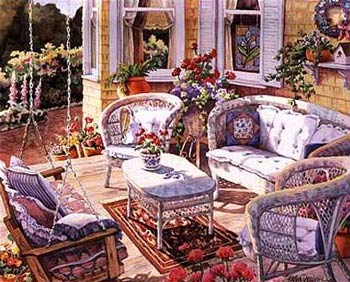 Porch, by Erin Derner
Porch, by Erin DernerCreative frugality requires looking at things in a different way. Sometimes we have more than we think we do, but we are stuck in a mind set that it can only be used one way or cannot be changed.
Tuesday, April 08, 2008
Subtle Frugality

To make frugality a subtle art, it is good to keep up with things like entertaining and helping others, being creative, or sharing your talents and knowledge. You may not have much money but life doesn't have to stop.
Hospitality is especially important if you are trying to be frugal. It gives you the social life that seems to lift you, and others, out of discouragement. Like "When Queens Ride By," it gives the impression that all is well in the kingdom and that the Queen is still alive and thriving. There used to be people who would deliberately have a celebration with friends and loved ones when they met with hard times, just to show their appreciation for them. Afternoon tea is the least expensive kind of hospitality and is so elegant, an excellent gesture in times of hardship. This kind of activity provides a luxury that makes life seem rich. It does not cost much, either, and most people are happy to come over for tea made in a real teapot and served in your good china cups.
Some of you might remember watching a series in the 1950's called "Wagon Train," depicting the treacherous journey across America to Oregon or California, via the Conestoga wagons. Not all the travellers were rich, but at night when they had camped, they enjoyed music and fellowship that many rich people did not.
Others can remember when nobles and lords suddenly lost their fortunes, yet kept an air of propriety about them. Just because they had no money, did not mean they would not speak properly or refuse to bathe or suddenly become thieves. Poverty is not an excuse to become lesser human beings. Many of my generation would have been considered very poor by today's concept of poverty. We still had to wash our hair and faces, brush our teeth, keep our clothes clean, and keep a clean house and behave honorably to our parents. If there were no jobs, we at least used the time off to improve our own houses, work on the garden, or do something useful. It is important to dress up and look up and not accompany lack of money with a sour attitude or sink into depression.
Being subtle means being hardly noticeable where wealth or poverty is concerned. Just as anyone would be dismayed at someone showing off their wealth and living to excess, wearing your poverty on your sleeve might be offensive to some. It is possible to explain your frugality with words like, "I have developed a liking for spending the evenings at home," when asked to go out, or "We haven't decided what kind of furniture we want yet. We are going to use this until we find just the right set," might silence those who put pressure on you.
There is one other thing that can be demoralizing to the family when talking about being more frugal: telling people that you are too poor and can't afford something, can be a kind of put-down to your husband, especially if he is the breadwinner. You may not mean it to sound that way, but it does send the message that he isn't a good provider. Instead of saying you are too poor, say that the item is too expensive.

Monday, April 07, 2008
The Home Newspaper
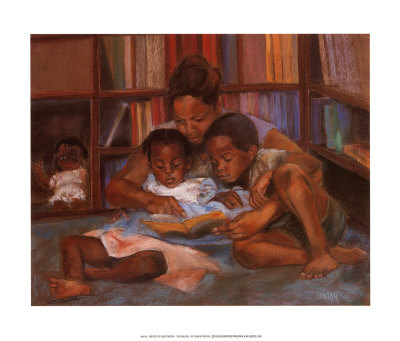 Reading, by S. Wilson from allposters.com
Reading, by S. Wilson from allposters.comWe wrote out verses in small boxes around the paper and decorated them with fancy hand-drawn borders. We might have included the menu for the day, and even paper dolls for the girls and a truck for the boys. All this was hand-done.
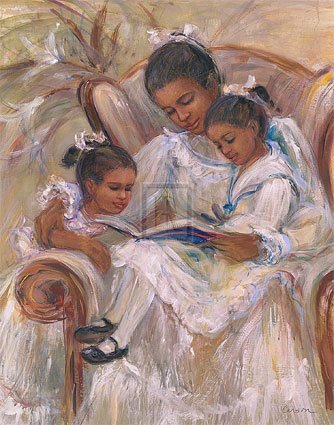 Pure Hearts by Liv Carson from allposters.com
Pure Hearts by Liv Carson from allposters.comThe three artists I show today have a host of other good paintings. Just type in their names at allposters and enjoy
Thursday, April 03, 2008
The Bright Side of Frugality
 Cotswold Hills by Peter Adams, from allposters.com
Cotswold Hills by Peter Adams, from allposters.comAnother bright side to frugality is the absolute beauty you can make of everything. Instead of getting a new table, you can paint your old one. Learn to use the various wood glues to stabilize loose legs and arms on chairs. The old wood is better than new wood, which is often made up of various glues and chemicals, so you are better off with your older pieces anyway.
